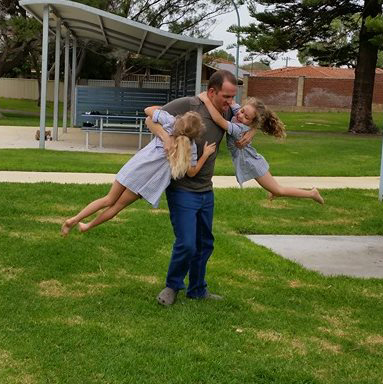Ever wondered what life as a FIFO mum is like? Get a glimpse through these 11 things I learned that helped us make the best of our situation.
There are many FIFO families in Australia and we were one of those for a few years. At that time our two girls were still in daycare and the early years of primary school.
Hats off to the FIFO families who have rosters that require more time on site than at home, especially the 4-1 rosters (four weeks away, one week home). I don’t know if we would’ve done it if we were offered this roster. My husband had an equal roster: 2-2: two weeks away, two weeks home.
In order for us to make it work, we actually had to sit down and create some rules and routines that suited us best. Some of the following are things we established from the start, others were lessons I learned along the way. And while this article is written from the perspective of my husband working a FIFO roster, I’m sure many of the tips are still useful if it is mum who works away on site.
1. Keep the FIFO parent informed of what is going on at home
This way they still feel part of the family.
2. Countdown for the younger ones
As the girls were still fairly young, they didn’t really have a concept of time. We had a visible countdown calendar for them to see the days go by. And no, they didn’t have to cross anything off. I stuck Smarties on the calendar, so each morning they could have one. This is still a fond memory for them.
3. Make a big fuss when your partner comes home
We always had a special dinner when Daddy got home. Sometimes, my energy was spent by this time, so special dinner was Daddy’s favourite quick-fix meal and jelly for dessert.
I also tried keeping that day free from after-school activities so we could go to the park or just have some family time.

4. Give them space
On Dad’s first full day home, I made sure to let him be. He usually tinkered away in his shed, caught up with emails and admin, and sorted out other things on his own to-do list. But even if he did absolutely nothing, I was still OK with that. I knew that he worked long hours, including weekends, and that he was really tired when he got home. And he’s an introvert, surrounded by people for a long time. Yes, I was tired too, but . . .
5. Plan your time so everyone knows what’s coming
On his second full day home, we would go for breakfast after school drop-off. The first half was a date, enjoying each other’s company and catching up on news. Then I would take out a printed calendar with what’s happening while he’s home. All the school and after-school activities, BBQ invites, birthday parties and everything else. This then went on the fridge for everyone to see. He then knew what to expect so he could plan his days too. We also made sure to book in another date for us, as well as one day for me and one day for him to do whatever we wanted without kids. Some TLC and me-time. We also set up a to-do list of the things we (OK, me) would like to get done while he was home.
In the video below, psychologist Collett Smart discusses the importance of spending quality time with your child, its benefits and simple ideas for spending one-on-one time with your children.
6. No disciplining the first and last 24 hours
Daddy was not allowed to get into any disciplinary issues (I mean telling them off, raising his voice, giving them instructions for tasks and chores) for the first 24 hours home. Obviously if it was something really, really serious, yes, please help me. But this came about when we realised he wasn’t aware of brewing issues when he was away and might say the wrong thing at the wrong time to the wrong person making the wrong assumption, purely due to lack of contextual knowledge.
The last 24 hours before he flew out, he was again not allowed to discipline the girls. We didn’t want Daddy to leave on a negative note.
7. Work together as a team
I think the biggest thing for us was to realise that we were both tired and needed a break after an away stint. Dad was tired because he worked hard for long hours on site. I was tired because I had to run the household, parent and meet other obligations by myself while he was away.
We both needed a rest and I really needed a break from the kids, even though I love them with all of my heart. It was only by communicating our own needs, but also hearing the needs of the other, that we could truly come together and work as a team.
Dad would jump in and help with school run, dishes and laundry without being asked. If I had to ask him, it still felt to me that it was my “responsibility” and he was “helping”. By him seeing the full laundry basket and doing something about it, I felt he shared the responsibility with me as an equal team member. He also always made sure the lawn was cut, car serviced, bills paid and anything else to make my task easier while he was away.
I think a lot of men wouldn’t mind “helping”, but they need to be asked. I appreciated the fact that my hubby could just do it. Mind you, we’ve had numerous conversations about this before it clicked.
But my favourite was when he took the girls somewhere for the afternoon or even the day and I could just do whatever I wanted to do. And the girls were also having fun and creating memories with their dad.
8. Organise surprises
We sometimes tried to sneak in a picture, a card or Daddy’s favourite chocolate in his bag. Just be mindful of quarantine requirements, which was the case for us. Dad would then take a picture of his “find” and send it to us. Sometimes he would even put the pictures up in his office and the girls would have a chuckle if it was a pink flowery picture in his very industrial office.
At the beginning of his stint, he would often send a postcard to each girl and sometimes even to all three of us. Later, I thought that the postcards didn’t matter anymore to the girls as they were not excited about receiving it—until I discovered the latest one in their school bag, under their pillow or pinned up on their noticeboard. That’s when I realised that it still mattered. Obviously, I sent Daddy proof that they still appreciated it.
9. Celebrate special days
As FIFO rosters don’t take special occasions into consideration, we had to be creative. We celebrated special events like birthdays, Mother’s Day, Father’s Day—and even Christmas once—on dates when Dad was home.

10. Lower your expectations
Some nights, the girls and I had eggs on toast for dinner, but that meant we could sit around the table and have a chat about our day. Some weekends, we didn’t do anything spectacular. We just spent the day at home, did some chores, played Lego, read a book or played in the garden. And it was OK. I might not have some amazing Facebook memories and Pinterest-worthy photos of that time, but the girls were happy and I didn’t feel overwhelmed (most of the time).
11. Prepare for emergencies
Make sure you have a list of emergency numbers where the whole family can see it. Also include numbers for plumbers, electricians, family, friends and neighbours.
We had emergency drills with the girls. Each one had a task, even if they were only around four years old at the time. They knew it was a drill, but I would pretend I fell on the kitchen floor and was unconscious. Then they had to “call” 000 and we would have the whole conversation on what to say. Make sure they know their address. We even discussed the different uniforms for police, ambulance and firefighters, so they knew when to open the door.
I’m happy to report we never needed it, but you just never know.
The surprising benefit of FIFO
When Dad started working in a city office, the girls realised that they saw more of their dad during FIFO than an office-based position. Now Dad can’t make them crazy breakfasts and do school runs anymore. He can’t mow the lawn and do other household maintenance during the week, but now it happens over the weekends.
He now spends time with each daughter individually at bedtime to hear about their day as he is crazy about his girls. Weekends are also now spent as a whole family, even though the girls’ friends are becoming more and more important in their lives. We are still grateful for our opportunities, whether it is FIFO or office-based. It’s all about making the best of whatever your situation, together as a family.
How helpful was this article?
Click on a star to rate it!
4.9 / 5. 9
Be the first to rate this post!
Riki Deale
Related posts
Subscribe
Receive personalised articles from experts and wellness inspiration weekly!

